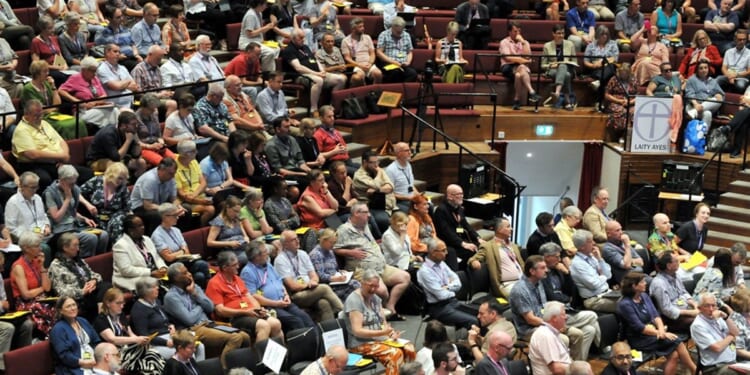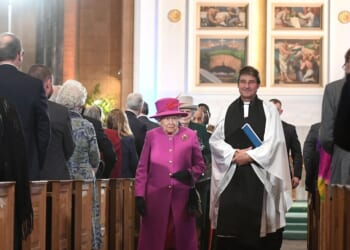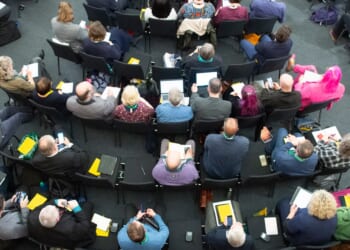CONCERNS about the “huge power” enjoyed by the body set to replace the Archbishops’ Council were voiced in Parliament last week, during a meeting of the Ecclesiastical Committee.
Convened to consider the National Church Governance Measure, which is set to overhaul the National Church Institutions (NCIs), the Committee heard lengthy criticism by Danny Kruger, the MP for East Wiltshire who defected from the Conservatives to Reform last month. His concerns were focused on Church of England National Services (CENS), a new charity replacing the Archbishops’ Council, that will be responsible for distributing funds allocated by the Church Commissioners.
The charitable objectives of CENS are: “To advance the Christian religion in accordance with the faith and practice of the Church of England, in particular by furthering, enabling, enhancing and co-ordinating its work and mission”, and “to advance any other charitable purposes which are ancillary to the purpose referred to in paragraph”. The Commissioners will determine the amount to pay from their general fund to CENS to allow it to “properly exercise its functions”.
CENS objectives were “vague”, Mr Kruger said. “At the heart of my anxiety is that the measure . . . essentially allows CENS to ask for money from the Church Commissioners. . . There is some discretion about the overall amount [the Commissioners] can pay . . . [but] it suggests there is no room for applying a wider discretion over the actual purpose of the money.”
The Measure sets out certain constraints under which CENS will operate. It must submit to the Church Commissioners a framework setting out its objectives for the funding period, and how it proposes to meet them. This must include a certificate confirming “the extent to which the amount paid by the Commissioners to CENS in the preceding year was used in accordance with the framework for the funding period concerned and a statement of the impact”.
CENS must also lay before the General Synod a summary of the proposals for inclusion in the framework, and have “due regard to the view expressed by the Synod . . . conscientiously taking into account the view expressed by Synod and giving it due weight”. It must lay its budget before the Synod “as soon as reasonably practicable after it has been prepared”. This represents a change from the current Measure, under which the Synod approves the budget — something that provoked concern during Synod debates this summer (News, 18 July).
There was no requirement for CENS to “adapt” its framework in response to the General Synod’s view, Mr Kruger said. “It is required to provide a certificate, but it is circular: the certificate merely confirms compliance by CENS with its own plans. It marks its own homework.”
Mr Kruger also raised concerns about one of the funding streams through which the Church Commissioners will make payments to CENS. Under the Church of England (Miscellaneous Provisions) Measure 2018, grants can be made to the Archbishops’ Council “for the purposes of the Council’s functions”. This will apply to CENS, under the Measure.
In recent years, Synod members have raised concerns (Letters, 7 March) about the sums being allocated via this stream: £38 million in 2023, compared with £33.5 million under the 1998 Measure: a stream serving “provision for cure of souls in parishes where help most required”. A total of £81.4 million was allocated under both streams.
Last week, Mr Kruger told the Committee that he feared that the 2018 Measure was being abused. He said: “It wasn’t supposed to be the main funding stream for the Church but it has become so: very widely drawn spending criteria that allow all sorts of things that go way beyond what the Church Commissioners were originally set up to do.”
In February, Carl Hughes, who chairs the Archbishops’ Council finance committee, agreed that more money was being spent under the Measure than had been expected, but said that this was due to the instructions of the Synod, which had approved spending on initiatives such as racial justice and net zero (News, 21 February).
Under the National Church Governance Measure, most of the non-investment functions of the Church Commissioners will be transferred to CENS, including the functions of the Mission and Pastoral Adjudication Committee, which rules on pastoral reorganisation, including church closures. Mr Kruger expressed concern that an “unaccountable bureaucracy” would hold this power.
He praised the revision of the Measure to include an amendment from Fr Marcus Walker, who chairs the Save the Parish movement, under which CENS will have to have “particular regard to making additional provision for the cure of souls” in the poorest parishes in England. But, Mr Kruger warned, this “feels unenforceable . . . a nod to a decent principle with no actual teeth”.
He said: “There need to be proper checks and balances between these quite different functions [the Church Commissioners, CENS, Parliament]. What is being done is an attempt to smooth over all over the tensions . . . in the interests of rationalisation and simplification. And the actual result is going to be huge power held in the hands of a new charity which is unaccountable to Parliament or to Synod, to do what it likes.”
He would vote against the Measure, he said.
Defence of the Measure emphasised the charitable law under which CENS would operate. Sir David Lidington, a former Lord Chancellor who chaired the National Governance Reform project board, told the Committee: “We couldn’t phrase legislation in a way that would give General Synod or anyone else the right to override what would be the legal responsibility of charity trustees, but we accepted the point that the Synod needed to be able to have an influence and help shape the deliberations of the trustees, and that is why the ‘due regard’ phrase is in there.”
He drew attention to the “formal scrutiny mechanisms” in the Measure. These include the establishment of a Synodical Scrutiny Committee, whose responsibilities will include a five-yearly review of CENS’ exercise of its grant-making power.
In addition, the Synod may, by a resolution supported by at least 100 members, convene a “committee of inquiry” to conduct an inquiry into a National Institution where it has “grave concern that the Institution has suffered a loss of money or assets or damage to its reputation”.
Sir Robert Buckland, the Third Church Estates Commissioner — whose function will be abolished under the new Measure — also offered a robust defence, emphasising the continuity with previous structures.
Both the Church Commissioners and CENS were subject to charity law and their own fiduciary duties, he said. “If anything, there is more accountability as a result of the framework that is being set up. . . The idea that one of the bodies of the Church of England can go off on a frolic of its own and start spending money in a way that would be wholly inconsistent with the mission is misconceived.”
The Mission and Pastoral Adjudication Committee would remain an “arms-length body”, and would be chaired by someone independently appointed by the King, as opposed to the Archbishop of Canterbury, as is currently the case.
Delaying reform meant “putting more cost” on the NCIS in a way that did not serve the laity, Sir Robert said. “I think, having thought about the matter very carefully, and of course offered myself up as a sacrifice, if you like, that the transition is something we can manage well.”
Among parliamentarians voicing concern was Lord Lisvane, who referred to the three years that he had served on the Parliamentary Delegated Powers Committee. “Were this a Government Bill, I think that committee would go into carnivore mode,” he said. “These are really quite extensive powers, with relatively limited constraint on them it seems, and it is what drafters are always told to avoid: making provisions which allow or expect a body to pull itself up by it own boot straps.”
Baroness Eaton expressed concern about “where accountability sits for safeguarding in the new arrangements”.
The director of the National Church Governance Programme, Stephanie Harrison, said that she was unable to be drawn on this, as the process of establishing independent safeguarding at a national level was happening in parallel with the reform of governance.
Championing the Measure, Sir David warned: “We are left with a status quo that is dysfunctional. . . Staff who waste far too much time at the moment serving umpteen committees where the Church keep referring things from one body to another, and nobody will take a decision.”
As chairman of the project board, he had been “frankly shocked” at “the levels of mistrust that there were between the different institutions and members of those institutions”. The “overriding objective” of the reforms was, he said, “to try to amend the administrative arrangements of the Church of England in such a way as would be conducive to creating a culture of much greater trust and mutual confidence and co-operation”, with a focus on accountability.
The lack of trust had led him to conclude “that we need not just to reframe and change the power of the Archbishops’ Council, but expressly to abolish the Archbishops’ Council as it currently exists, and to replace it with something different. It is full of very well-meaning and hardworking people; it was set up with the best of intentions. It has not worked.”
In addition to Synod members expressing their concerns to him, he had been told by members of the House of Bishops that “they really don’t have much faith in the General Synod.”
The Bishop of Guildford, the Rt Revd Andrew Watson, who is the episcopal lead on governance reform, emphasised that the proposals had been developed over five years, with more than 400 amendments considered, and had the “very unusual” near-unanimous support of the Synod. The Measure offered “greater assurance” to the Church Commissioners about the use of funds, and “increased provision” for detailed questioning of the NCIs by the Synod.
The part played by the new Second Church Estates Commissioner remained unchanged, and entailed being answerable to Parliament for the work of all of the NCIs.
At the conclusion of the session, he urged the Committee to provide “much greater clarity about what really is wrong with it. It seems to be there have been so many criticisms thrown from so many places, some of them I would have to say based on a misunderstanding of what we are doing.” He was, he said, “worried that the best is going to be the enemy of the good”.
The Committee was unable to vote on the Measure owing to the absence of the Second Church Estates Commissioner, Marsha de Cordova MP, at the conclusion of the session, which had exceeded the allotted time. It will now sit in private to consider its deliberations.

















